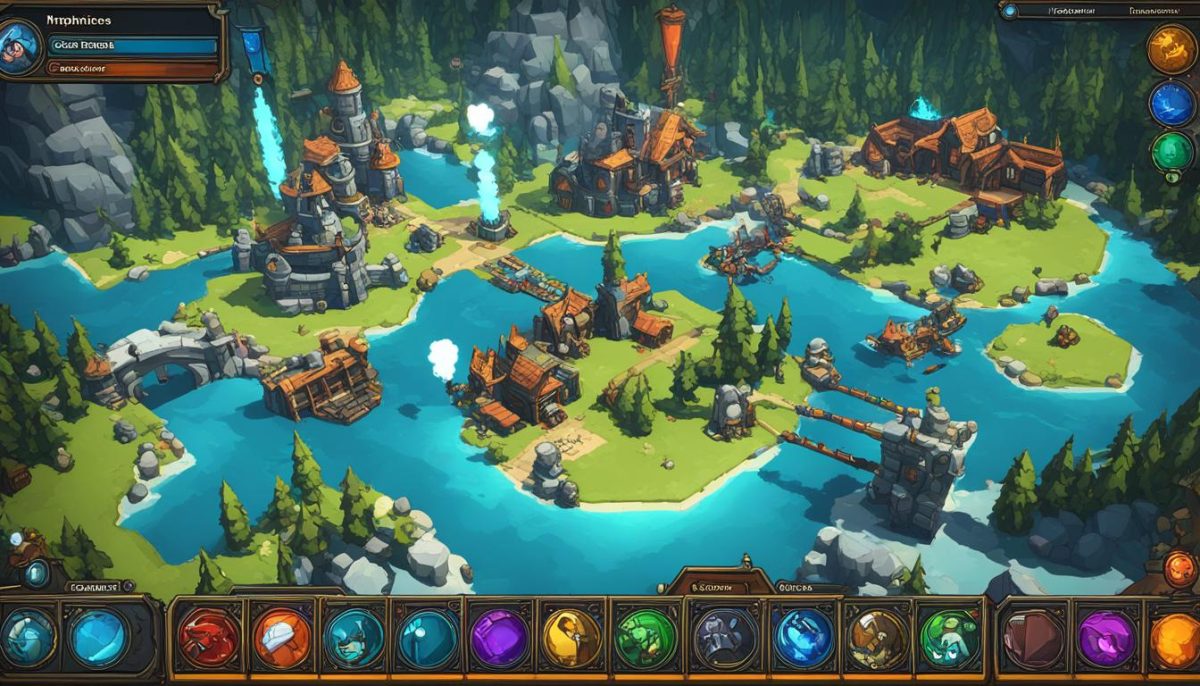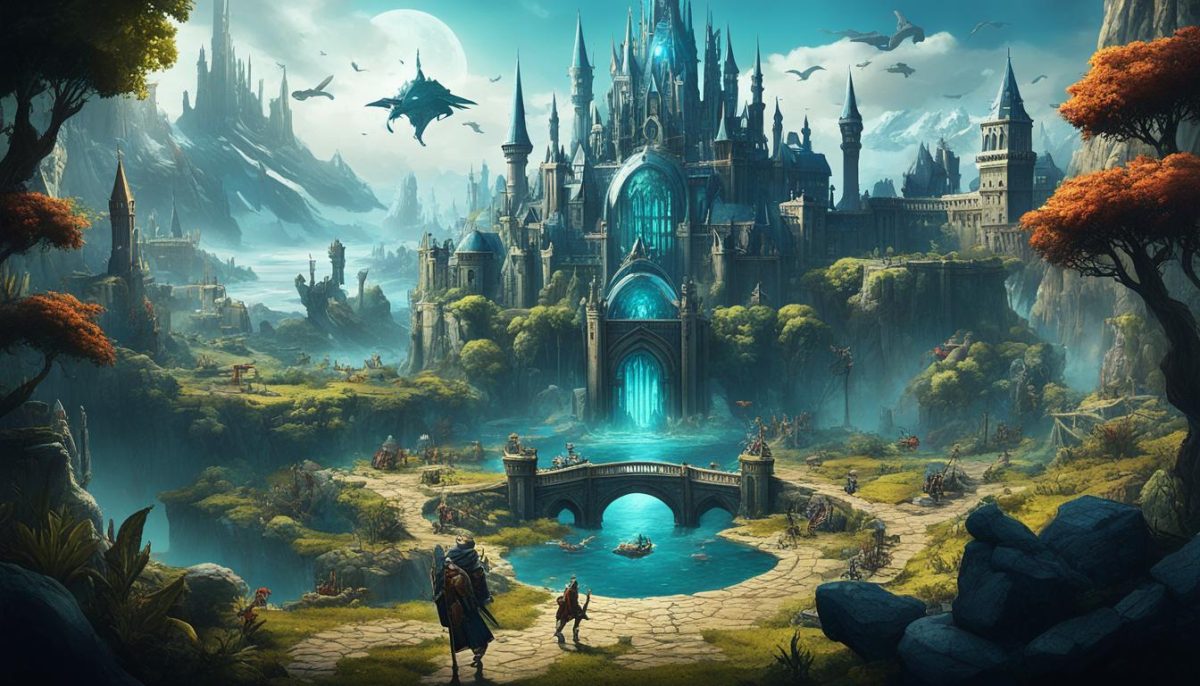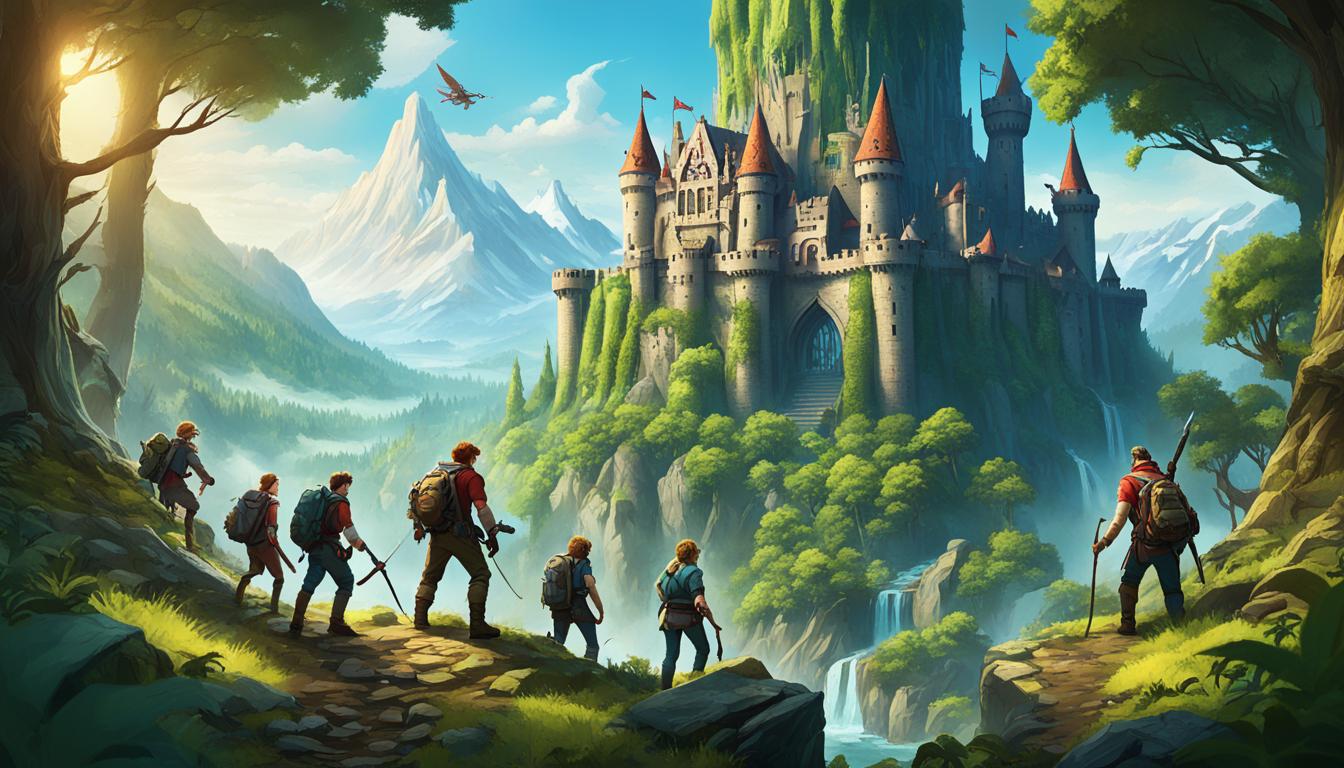Welcome to the immersive world of RPG games! Have you ever wondered how these captivating games function? In this section, we will take a deep dive into the mechanics of RPG games and explore what makes them so enthralling.
RPG games, or Role-Playing Games, immerse players in captivating storylines, allowing them to step into the shoes of unique characters. These games offer a perfect blend of strategic gameplay, character development, and immersive storytelling.
Immerse yourself in spellbinding narratives as you embark on epic quests, battling monsters, solving puzzles, and unraveling mysteries. RPG games are known for their expansive worlds and captivating storytelling, creating a truly immersive experience for players.
As you progress through the game, your character evolves and grows, providing a sense of accomplishment and personalization. Levelling up, acquiring new abilities and equipment, and making impactful choices along the way are key elements of character development in RPG games.
Strategic gameplay is another crucial aspect of RPG games. Players must carefully plan their actions, manage resources, and make decisions that can shape the outcome of the game. Whether it’s choosing the right tactics in combat or deciding the fate of a kingdom, strategic thinking is essential in RPG games.
In the upcoming sections, we will explore the core mechanics of RPG games in more detail. We will delve into the various gameplay elements, the importance of player choices, the art of immersive storytelling, and the intricacies of character development and progression. So, let’s get ready to embark on an unforgettable gaming adventure!
Understanding RPG Mechanics
In the vast world of role-playing games (RPGs), the gameplay mechanics serve as the backbone that brings the game to life. These mechanics consist of various interlocking elements that shape the player’s experience, from character progression to immersive storytelling. Let’s explore the key RPG mechanics that make these games so captivating.
Gameplay Elements
At the heart of RPG mechanics are the gameplay elements that drive the player’s engagement. One essential gameplay element is the concept of leveling up. As players progress through the game, they earn experience points that enable their characters to grow stronger and unlock new abilities.
Another important aspect is skill progression. RPG games often feature skill trees or systems that allow players to customize their character’s abilities based on their preferences. This adds depth and strategy to the gameplay, as players must carefully consider which skills to prioritize.
Character customization is yet another gameplay element that RPGs excel at. Players can often choose from a variety of races, classes, and appearance options to create a character that suits their playstyle and personal preferences. This level of customization enhances the sense of ownership and immersion.
Player Choices
One of the defining features of RPG games is the emphasis on player choices. These choices can significantly impact the game’s narrative and outcome, making each playthrough unique. Whether it’s deciding the fate of a character or choosing a path in a branching storyline, the player’s decisions have consequences.
Player choices also extend beyond the main storyline. RPG games often offer side quests and optional missions that allow players to explore the game world and make decisions that affect their character and the surrounding NPCs. This freedom to shape the game’s events adds depth and personalization to the overall experience.
“In RPG games, every choice you make is a reflection of your character and can shape the game’s world in unexpected ways.”
Ultimately, RPG mechanics empower players to immerse themselves in rich and dynamic game worlds. By providing engaging gameplay elements and meaningful player choices, RPGs offer a truly interactive and unforgettable gaming experience.
Now, let’s take a closer look at how RPG games captivate players with their immersive storylines and worldbuilding.

Immersive Storylines and Worldbuilding
One of the defining features of RPG games is their immersive storylines. These games transport players to fantastical worlds filled with epic quests, intriguing characters, and dramatic plot twists. RPG storylines are meticulously crafted to engage players in narrative-driven gameplay, where their choices and actions shape the course of the game.
Developers invest considerable time and effort into creating rich and engaging narratives that captivate players from start to finish. RPG storylines often incorporate elements of fantasy, science fiction, or historical settings, allowing players to explore a vast array of worlds and cultures.
Worldbuilding plays a crucial role in crafting these immersive storylines. It involves creating a detailed and believable game world with its own history, geography, and lore. RPG games place great emphasis on this aspect, as it provides the backdrop for the story and helps players feel connected to the game’s universe.
Through worldbuilding, developers create a cohesive and believable environment where players can immerse themselves. From bustling cities and lush landscapes to ancient ruins and treacherous dungeons, each location within the game world is meticulously designed to enhance the player’s sense of exploration and discovery.
“RPG games are known for their immersive storylines, captivating players with compelling characters, intricate plotlines, and engaging quests. Worldbuilding serves as the foundation for these narratives, creating vibrant and believable game worlds that players can fully immerse themselves in.”
The Importance of Narrative-Driven Gameplay
Narrative-driven gameplay is a fundamental aspect of RPG games. It places the story at the forefront, giving players the opportunity to delve into a rich and engrossing narrative. Unlike other genres, where gameplay mechanics take precedence, RPG games prioritize storytelling, character development, and player choices.
The narrative-driven gameplay in RPGs allows players to become fully invested in the game’s world and characters. Every decision made by the player can have far-reaching consequences, shaping the outcome of the storyline and influencing the relationships with non-playable characters.
RPG games are renowned for their branching storylines, where players can choose between different paths, alliances, and outcomes. These choices provide players with a sense of agency, making them feel like active participants in the game world rather than mere observers.

Whether embarking on a heroic quest to save the world or navigating complex political intrigues, RPG games offer a sense of escapism and immersion like no other genre. The carefully constructed storylines blend seamlessly with gameplay mechanics to create an unforgettable experience for players.
Character Development and Progression
One of the most captivating elements of RPG games is the character development and progression systems they offer. These games allow players to create unique characters and embark on epic adventures, shaping their journey and growth along the way.
One key aspect of character development in RPG games is the ability to choose a class. Whether it’s a mighty warrior, a cunning rogue, or a wise mage, players have the freedom to select a role that suits their playstyle and preferences. Each class brings its own set of abilities and skills, contributing to the overall gameplay experience.
As players progress through the game, they have the opportunity to acquire new abilities, level up their skills, and unlock powerful upgrades. This progression system not only adds depth to the gameplay but also allows players to tailor their characters to their desired playstyle. It’s a rewarding feeling to see your character grow stronger and more capable as you overcome challenges.
In addition to character development through leveling up and acquiring abilities, RPG games often feature a wide array of equipment that players can find or craft. From powerful weapons to enchanted armor, these items further enhance the character’s capabilities and provide strategic choices. Players can customize their characters by equipping different gear combinations to suit the challenges they face or maximize their preferred playstyle.
Overall, the character development and progression systems in RPG games are integral to the immersive experience they offer. Players have the freedom to create unique characters, shape their skills and abilities, and witness their growth throughout the game. Whether you prefer playing as a cunning rogue, a mighty warrior, or a skilled mage, RPG games provide endless opportunities for character customization and growth.

